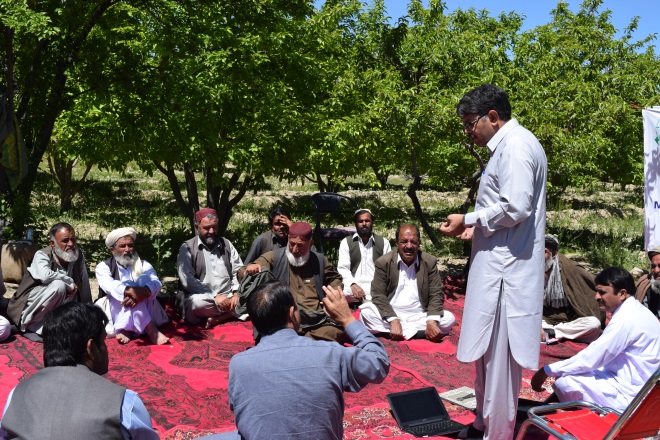
Balochistan province is famous for producing apples, contributing more than 80% to the total apple production in Pakistan, and therefore has a significant impact on the household income of farmers in the region. However, apples are also prone to infestation by a number of different pests, of which the apple codling moth (Cydia pomonella) is of major concern.
Sole dependency on chemicals to regulate pest problems has raised many environmental and health risks which require the integration of sustainable and safer alternative management techniques. In this regard, biological control is being advocated all over the world as being safer to humans and the environment. CABI is currently implementing a USAID-USDA funded Phytosanitary Risk Management Program (PRMP) in Balochistan province to carry out a biological control program for apple pests in the region and to upscale the national biological control system.

Farmers meet to discuss control of apple pests such as the codling moth
Maula Dad is a progressive farmer from Khanozai, a small valley town located in the Pishin District of Balochistan province. Khanozai is known for its agriculture and mineral resources, and is home to some of the highest quality apples in Pakistan. Mr Dad has been the most actively involved with PRMP activities in the region since its inception. While talking to the CABI project team he described how he has been growing and exporting apples for many years, yet he was unaware of alternative pest management techniques that could increase his crop potential. Prior to CABI’s intervention, he had even quit farming due to the decrease in the quality of his produce as a result of irrigation and pesticide issues. Mr Dad said that the pesticide application was repeated 4-5 times and although it did reduce some crop infestation, it also had a deteriorative effect on the quality of apples causing his export potential reduce dramatically. He said that he had participated in the inception meeting of the PRMP project in Balochistan and was intrigued with the concept of biological control. He understood the beneficial aspects of the technology and assisted the CABI project team by offering his orchards for the application of this technology.

Mr Maula Dad (centre)
Maula Dad further shared his views that over the first year, he saw a considerable reduction in the population of the codling moth in his orchard and moreover, the crop quality had improved significantly. The income generated from his produce allowed him to invest in the installation of a water pump for irrigation, and his pesticide application has been reduced to just one cycle per season.
Mr Dad also participated in farmer meetings sharing his success on controlling the pest with other farmers and he has recently become the chairperson of the local Apple Growing Society. “During the present growing season, the infestation of codling moth is nowhere to be seen due to biological control interventions implemented by the CABI project team,” he said. “My apples are now being sent to national and international markets whereas in past I was confined to the local markets in Balochistan. Now I am earning PKR150,000 ($1300) during the peak months of apple season, compared to being hand to mouth previously.”

An apple orchard in Quetta, Balochistan
Due to the success of CABI’s biological control interventions, Maula Dad is planning to purchase new land for the expansion of his orchard and has generously donated 60 apple trees to the project team for applied research activities and to establish it as a model for other farmers. He has also insisted to bear financial responsibilities if any loss does occur to the experimental trees; a clear indication of his trust on CABI. Maula is also a frequent visitor to the Biological Control Laboratory in Quetta where he regularly enquires about any developments of novel technologies and has also suggested training on biological control of pests of other commodities being grown in Balochistan.
Find out more: Phytosanitary Risk Management Programme in Pakistan
Related News & Blogs
Highlights from 2024: Most read blogs
As 2024 draws to a close, we’ve tallied the numbers to showcase this year’s highlights on the CABI Blog. From pest management and innovative agricultural courses to youth training initiatives and global recognition, these posts demonstrate the scope of…
17 December 2024




